Lesson Sixteen
Dialogue sixteen: Ladies finding out about cooking
L: Der khkhÚlay polaaw day. daa mU tsínga pokh kúRay day? This is very nice pulao. How did you (pl.) cook it? Teach me the method. | ډېر ښُکلے پولاؤ دے. دا مو څنګه پوخ کړے دے؟ ما ته يې طريقه وښايه. |
H: awál ba pu ghwaRó ke TamaaTúr aw piyaaz du gárme masaale sara sru ke. byaa ba pu ke safaa shiwe wrejze wáachawe. oobú ba pu ke wáachawe, aw byaa ba ye óoyashawe. che oobú tsu wakht ó oche shee no wrejze ba tayaare wee. First you will put tomatoes and onions in oil and fry with hot spices. Then you will put in the cleaned rice. You will then put in water and boil it. When the water is dry the rice will be ready. | اول به په غوړو کښې ټماټر او پياز د ګرمې مصالحې سره سرۀ کې. بيا به پ ه کښې صفا شوې wورېژې واچوې. اوبۀ به په کښې واچوې، او بيا به يې وويشې. چې اوبۀ څۀ وخت وچې شى نو وريژې به تيارې وى. |
L: kÚme masaale ba pu ke áchawum? Which spices do I put in? | کُومې مصالحې به په کښې اچوم؟ |
H: baazáar ke che kuma tayáara gárma masaalá wee haghá pu ke wáachawa. Put in whatever prepared hot spices are in the bazaar. | بازار کښې چې کُومه تياره ګرمه مصالحه وى هغه په کښې واچوه. |
L: óoga aw adrák taaso kuTwúy ke wăle istimaalawéy? Why are you using garlic and ginger in the curry? | اوږه او ادرک تاسو کټوۍ کښې ولې استعمالوئ؟ |
H: de sara kuTwúy khu kégee aw mazedaara kegee. They make the curry good and tasty. | دې سره کټوئ ښۀ کېږى او مزېداره کېږى. |
L: ghwákha du mékhe zur pakhégee aw ku du ghwaa? Does buffalo meat cook faster or cow's meat? | غوښه د مېښې زر پخېږى او کۀ د غوا؟ |
H: du mékhe aw du ghwaa khabúra nu da, ghwákha che du zwaan tsarwée wee no zur pakhégee. It is not a matter of whether if it is buffalo or cow, if it is the meat of a young animal it will cook quickly. | د مېښې او د غوا خبره نۀ ده، غوښه چې د ځوان څاروى وى نو زر پخېږى. |
NOTE:
څاروے - tsaarwáy (څاروی - tsaarwée (inflected or plural form)) is a general tern referring to domestic animals kept for meat or milk.
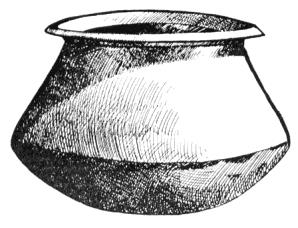
Men: Eating at a restaurant
L: halúka, tsu de paakhe kuRee dee? Lad, what have you cooked? | هلکه، څۀ دې پاخۀ کړى دى؟ |
H: chaNá, ghwákha, saag, poláaw , sabzée, churg aw téeke. tsu ráawRum, seb? Chick peas, meat, spinach, pulao, vegetables, chicken and tikkas. What shall I bring, sir? | چڼه، غوښه، ساګ، پولاؤ، سبزى،چرګ او تيکې. څۀ راؤړم، صېب؟ |
L: daa shaan óoka! yo kaRáay téeka ráawRa aw wăr sara sabzée hum ráawRa! Do like this, bring a karai tikka and with it bring vegetables! | دا شان وکه! يو کړائ تيکه راؤړه او ورسره سبزى هم راوړه! |
L: salaad aw chaka ba milaaw shee? Do you have salad and chaka [a yoghurt sauce]? | سلاد او چکه به مِلاؤ شى؟ |
H: bilkÚl seb, be ghúma shey, hăr tsu ba miláaw shee. Absolutely sir, don't worry everything will be available. | بِلکل صېب، بې غمه شئ، هر څۀ به ملاؤ شى. |
NOTE:
During the meal
L: raasha khabúra wáawra! dwa roTúy garme garme ráawRa! Come here, listen! Bring two hot, hot breads! | راشه خبره واوره! دوه روټۍ ګرمې ګرمې راوړه! |
H: daa wáakhley garme roTúy. noor kho jee tsu nu dee pu kaar? Take this, hot bread. You don't need anything else? | دا واخلئ ګرمې روټۍ. نور خو جى څۀ نۀ دى پکار؟ |
L: na, mirabaanee, che pu kaar shee no aawaaz ba dărkawum. No thanks, if I want something I will call. | نه، مِهربانى، چې پکار شى نو آواز به درکړم. |
L: Dere khkÚle teeke we! daa wáakhla! panzós roopúy staa ináam sho. néeme staa shwe, néeme du Ustáaz shwe. They were very good tikkas! Take this. Fifty rupees is your tip. Half for you, half for the cook. | ډېرې ښکُلې تيکې وې! دا واخله. پنځوس روپۍ ستا اِنعام شو. نيمې ستا شوې، نيمې د اُستاذ شوې. |
L: staaso khwaráak zmoong khwakh sho. moong ba byaa raazoo. We liked your food. We will come again. | ستاسو خوراک زمُونږ خوښ شو. مُونږ به بيا راځُو. |
Pronunciation drill
Illustrating خر - khr
| khurkáar Der khru saatée. | The donkey-wallah keeps many donkeys. | خرکار ډېر خرۀ ساتى. |
| DoDúy pu khrap khrap mú-khora! | Do not eat food noisily. | ډوډۍ په خرپ خرپ مۀ خوره! |
| zu khpula géera khraayum. | I am shaving my chin [lit. 'beard']. | زۀ خپله ږيره خرايم. |
NOTE:
خرکار - khurkáar translated 'donkey-wallah' is the man who keeps donkeys that are used to carry bricks in buiding sites, etc.
A tongue twister
Try this matal:
Introducing the subjunctive mood
The subjunctive mood is used to express possibilities, wishes, desires and obligations. While the present form talks about things that are definately true, the subjunctive talks about actions that are hypothetical, possible, or in some doubt.
Making the subjunctive form
As we saw in lessons 14 and 15, the subjunctive forms of verbs are used in many different grammar constructions, so it’s very important to understand how they are formed. Here are a few rules that will help you get started in recognizing them:
- For most regular verb stems, simply add a و - oo / w to the front of the present verb stem, and bring the emphasis on to the first syllable.
| Verb | Present | Subjunctive |
|---|---|---|
leedúl to see لیدل | wéenum وینم | óoweenum ووينم |
wahúl to hit وهل | wahúm وهم | óowahum ووهم |
- Some words can’t take a و - oo in front, either because they are a seperable verb like کېناستل - kenaastul or بوتلل - botlul or because they already start with an و - oo in front like ودرېدل - oodredul. For these words you can make them subjunctive by taking the present form and bringing the emphasis to the front.
| Verb | Present | Subjunctive |
|---|---|---|
botlúl to send بوتلل | bozúm بوځم | bózum لوځم |
oodredúl to stop ودرېدل | oodrégum ودرېږم | óodregum ودرېږم |
- Other words like the کول - kawul and کېدل - kedul auxillary verbs used in compound verbs are irregular. They have subjunctive forms that often look like a totally different verbs. (See charts at the end of the chapter for more info).
| Verb | Present | Subjunctive |
|---|---|---|
kawul to do کول | kawee کوی | óokRee / óokee وکړی |
khabure kawul to talk (to do talk) خبرې کول | khabure kawee خبرې کوی | khabure óokRee / óokee خبرې وکړی |
kawul to make کول | kawum کوی | kRee / kee کړی |
maatawul to break (make broken) ماتول | maatawee ماتوی | maat kRee / kee مات کړی |
kedúl to happen کېدل | kégee کېږی | óoshee وشی |
kaar kedul for work to happen کار کېدل | kaar kégee کار کېږی | kaar óoshee کار وشی |
kedúl to become کېدل | kégee کېږی | shee شی |
maatedúl to break (become broken) ماتېدل | maatégee ماتېږی | maat shee مات شی |
oRul to take (inanimate) وړل | oRee وړی | yósee یوسی |
tlul to go تلل | zee ځی | laaR shee لاړ شی |
- Equative verbs like can be subjunctive, but the 3rd person forms are always changed to وی - wee in the subjunctive.
Different ways to use the subjunctive mood
1. Possibility:
Phrases that express possibility like کېدے شی چې... - kedáy shee che... (It's possible that...), شاید - shaayid (perhaps) and انشاءالله - inshaallaa (God willing) are often connected to a phrase (clause) with a subjunctive verb.
| kedáy shee che haghwée hálta wee. | It is possible that they are there. | کېدے شى چې هغوى هلته وى. |
| keday shee che zu ye maalóom nu kRum. | It is possible that I will not find it. | کېدے شى چې زۀ يې معلُوم نۀ کړم. |
| kedáy shee che zu hum laaR shum. | It is possible that I will also go. | کېدے شى چې زۀ هم لاړ شم. |
| kedáy shee che day hum wugay wee. | Perhaps he is also hungry | کېدے شى چې دے هم وږے وى. |
| shaayid che zu nun hagha óoweenum. | Maybe I will see him today. | شايد چې زۀ نن هغه ووينم. |
| shaayid che haghá ba wăr-sara khabure óokee. | Perhaps he will talk with them. | شايد چې هغه به ورسره خبرې وکى. |
| inshaallaa du búle jUme póre ba zu wapás shiway yim. | God willing, I will have returned before next Friday. | انشاءالله د بلې جُمعې پورې به زۀ واپس شوے يم. |
| inshaallaa, bul kaal póre ba zu kha pukhtó zda kRum. | God willing, I will learn good Pukhto by next year. | انشاءالله، بل کال پورې به زۀ ښۀ پښتو زده کړم. |
NOTES:
The last phrase includes the pre- and postpositions د ___ پورې - du ___ pore (up to), although often the د - du is left out. Note some of its uses in the following examples:
| du khaar póre tso roopúy áakhlee? | How many rupees does it take to get to the city? | د ښار پورې څو روپۍ اخلى؟ |
| shpugo bajo pore dălta yim. | I'm here up to six o'clock. | شپږو بجو پورې دلته يم. |
| raatlóonkee kaal póre ba tsu kawe? | What will you do until next year? | راتلُونکى کال پورې به څۀ کوې؟ |
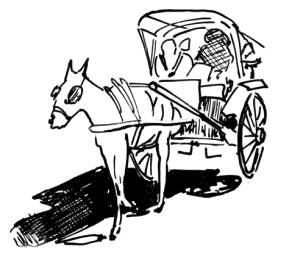
2. Necessity, responsibility:
Phrases with پکار - pu káar (neccesary, have to, need to, should), ضرُور - zaróor (must), لازم - laazím (necessary), مجبُور - majbóor (compelled to, forced to) and حاماخا - khaamakháa (definately, must) often use the subjunctive mood.
| moong la du haghwée madúd kawul pu káar dee. | We should help them. (not subjunctive) | مُونږ له د هغوى مدد کول پکار دى. |
| pu kaar dee che rozaana warzísh óokRee. | It is necessary for him to exercise daily. | پکار دى چې روزانه ورزش وکړى. |
| pu kaar dee che maashoomáan oodú shee. | The children ought to go to sleep. | پکار دى چې ماشُومان اُودۀ شى. |
| taa ta pu kaar dee che daa kaar oo-nu-kRe. | You should not do that job. | تا ته پکار دى چې دا کار ونۀ کړې. |
| moong la du shaahid kor ta tlul pu kaar dee. | We need to go to Shahid's house. | مُونږ له د شاهد کور ته تلل پکار دى. |
| taa la khpul khpul kúlee ta tlul pu kaar dee. | You should go to your own village. | تاله خپل کلى ته تلل پکار دى. |
| tu zaróor haspatáal ta laaR sha! | You must go to the hospital. | تۀ ضرُور هسپتال ته لاړ شه! |
| haghá ba zaróor nun pu kor ke wee. | She has to be in the house today. | هغه به ضرُور نن په کور کښې وى. |
| tu ba sabaa zaróor raashe! | You must come tomorrow. | تۀ به صبا ضرُور راشې! |
| laazíma da che hăra wdraz du reDyo khabróona wáawroo. | It is necessary for us to listen to the radio every day. | لازِمه ده چې هره ورځ د رېډيو خبرُونه واورو. |
| laazíma da che nun du kor du paara sodaa wáakhloo. | It is necessary for us to buy groceries for the house today. | لازِمه ده چې نن د کور د پاره سودا واخلُو. |
| haghá du majboorúy na dălta paate kegee. | He is compelled to stay here. (not subjunctive) | هغه د مجبُورۍ نه دلته پاتې کېږى. |
| sabáa khaamakhaa DakTúr ta laaR shey. | You must go to the doctor tomorrow. | صبا خامخا ډاکټر ته لاړ شئ. |
| tu khaamakhaa haghá óoweena. | You must see him. (imperative, not subjunctive) | تۀ خامخا هغه ووينه. |
3. Wishes and desires:
اُمید لرل - Uméed larul (to hope), شوق - shoq (interest, desire), خُدائ دې وکی - khUdáay de óokee (may God do it), زړهٔ کېدل - zRu kedúl (to want) and غوښتل - ghokhtúl (to want) are often used in connection with phrases made from subjunctive verbs.
| zu Uméed larum che chagha ba du jel na raakhilaas shee. | I hope he will be set free from jail. | زۀ اُميد لرم چې هغه به د جېل نه راخلاص شى. |
| Uméed lare che zur ba kaar pedaa ke? | Do you hope to find work quickly? | اُميد لرې چې زر به کار پېدا کې؟ |
| zmaa zooy Uméed laree che khpul taléem pu landan ke póora kRee. | My son hopes to complete his education in London. | زما زوئ اُميد لرى چې خپل تعليم په لندن کښې پُوره کړى. |
| zmaa shoq day che angrezee zda kRum. | It's my desire to learn English. | زما شوق دے چې انګرېزى زده کړم. |
| zmaa shoq day che dUnyáa óoweenum. | My desire is to see the world. | زما شوق دے چې دُنيا ووينم. |
| khUdaay de baaraan óokee! | May God make it rain! | خُدائ دې باران وکى! |
| khUdaay de óokRee che byaa de óoweenum! | May God grant that we see you again! | خُدائ دې وکړى چې بيا دې ووينُو! |
| khUdaay de taa la du zRu eemáan dărkRee! | May God give you belief of the heart! | خُدائ دې تا له د زړۀ ايمان درکړى! |
| khUdaay de taa pu imtiháan ke paas kee! | May God grant that you pass the exam! | خُدائ دې تا په اِمتحان کښې پاس کى! |
The following express similar ideas without using subjunctive verbs:
| zRu ta de tsu kegee? | What would you like? | زړۀ ته دې څۀ کېږى؟ |
| DoDúy to me zRu kegee. | I would like some food. | ډوډۍ ته مې زړۀ کېږى. |
| chaayo to me zRu kegee. | I would like tea. | چائو ته مې زړۀ کېږى. |
| zu laambó wahúl ghwúaRum. | I want to swim. | زۀ لامبو وهل غواړم. |
| daa Der kaar kawul ghwaaRee. | She wants to do a lot of work. | دا ډېر کار کول غواړى. |
4. Questions and inquiries:
The subjunctive mood is also used to ask or make statements about whether potential actions should happen or not.
| zu chaa sara khabure óokum? | Who should I talk with? | زۀ چا سره خبرې وکم؟ |
| tu maalík sara khabure óoka. | You should talk to the owner. (imperative not subjunctive) | تۀ مالِک سره خبرې وکه. |
| zu kor ta laaR shum ku dăftur ta? | Should I go to the house or to the office? | زۀ کور ته لاړ شم کۀ دفتر ته؟ |
| maa la kor ta tlul pu kaar dee aw ku dăftur ta? | Do I need to go to the house or to the office? (not subjunctive) | ما له کور ته تلل پکار دى او کۀ دفتر ته؟ |
| khaamakhaa kor ta laaR sha. (imperative not subjunctive) | You should definitely go to the house. | خامخا کور ته لاړ شه. |
| tsu óokhoree? kabaab aw ku wréjze? | What should we eat? Kababs or rice? | څۀ وخورُو؟ کباب او کۀ ورېژې؟ |
| za che kabaab óokhoroo. | Let's eat kababs. | ځه چې کباب وخورُو. |
| tsunga kitáab wáakhloo? | What kind of book should we buy? | څنګه کتاب واخلُو؟ |
| za che du qiso kitaab wáakhloo. | Let's buy a story book. | ځه چې د قصو کتاب واخلُو. |
5. Permission:
| ijaazăt day che laaR shoo? | Is there permission for us to go? | اِجازت دے چې لاړ شو؟ |
| ijaazát day che staa taswéer oobaasum? | Is it OK that I take your picture? | اِجازت دے چې ستا تصوير اوباسم؟ |
| moong ta du raatlo ijaazăt day? | Do we have permission for coming? (not subjunctive) | مُونږ ته د راتلو اِجازت دے؟ |
| staa moTúr botlay shum? | May I take your car? (not subjunctive) | ستا موټر بوتلے شم؟ |
| zu dununa raatlay shum? | May I come in? (not subjunctive) | زۀ دننه راتلے شم؟ |
NOTE:
In Pashto, a ت - t is sometimes added to words of Arabic origin. Thus اِجازه - ijaazá (permission) becomes اِجازت - ijaazăt, شریعه - shari'a (Islamic law) becomes شریعت - shari'ăt, etc.
6. Exhortations and warnings:
Subjunctive phrases are often used with کوشش کوه! - koshish kawa! (try!), خیال کوه! - khyáal kawa! (be careful!, watch out!), پام کوه! - paam kawa! (be careful!), خبردار! - khabardáar! (beware!) and مهٔ کوه! - don't do it!.
| koshis kawa che pu imtiháan ke kaamyaab she. | Try to be successful in the test. | کوشش کوه چې په اِمتحان کښې کامياب شې. |
| du zda kawulo koshis kawa! | Try to learn! (not subjunctive) | د زده کولو کوشش کوه! |
| koshis óoka che peenzo bajo pore hálta óorase. | Try to reach there by five o'clock. | کوشش وکه چې پينځو بجو پورې هلته ورسې. |
| koshis kawa che pu haspatáal ke haghá óoweene. | Try to see him at the hospital. | کوشش کوه چې په هسپتال کښې هغه ووينې. |
| khyaal kawa che khog nu she! | Be careful not to get hurt! | خيال کوه چې خوږ نۀ شې! |
| khyaal kawa che pu chaayo baande khpula jzíba oo-nu-swazawe! | Be careful your tongue is not burned by the tea! | خيال کوه چې په چايو باندې خپله ژبه ونۀ سوزوې! |
| khyáal kawa che doká dăr-nu-kee! | Watch out that he doesn't trick you! | خيال کوه چې دوکه در نۀ کى! |
| khyaal kawa che spay taa oo-nu-khoree! | Be careful the dog doesn't bite you! | خيال کوه چې سپے تا ونۀ خورى! |
| khyaal kawa che nashá oo-nu-ke! | Be careful not to take drugs! | خيال کوه چې نشه ونۀ کې! |
| paam kawa che moTúr oo-nu-jangawe! | Be careful not to crash the car! | پام کوه چې موټر ونۀ جنګوې! |
| khabardáar! hálta maar day. | Beware there's a snake there. (not subjunctive) | خبردار! هلته مار دے. |
| mu kawa! wruk she! khog ba she! | Don't do it! Get lost! You will be hurt! | مۀ کوه! ورک شې! خوږ به شې! |
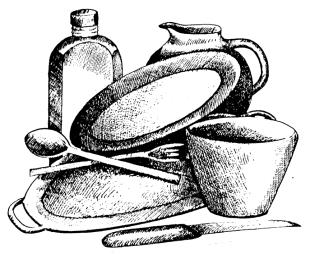
7. Conditional clauses:
که ____ نو - ku ___ no (if ____ then)
| ku daa raa-nu-ghla no zu ba laaR shum. | If she doesn't come, then I will go. | کۀ دا رانۀ غله نو زۀ به لاړ شم. |
| ku khu kaar óoke no noore payse ba dărkum. | If you do good work, then I will give you more money. | کۀ ښۀ کار وکې نو نورې پیسې به درکم. |
| ku gaRúy de kharáaba wee, no badúla ye ka! | If your watch is bad, then replace it! | کۀ ګړۍ دې خرابه وى نو بدله يې که! |
| che yo zal de nashá óokRa byaa ba tur múrga pore khiláas nu-she. | If you take drugs one time then you will not be free until death. | چې يو ځل دې نشه وکړه بيا به تر مرګه پورې خلاص نۀ شې. |
| yaara, che daa masulá haal shee no imdáad ba Der khosháala shee. | Friend, if this problem is solved then Imdad will be very happy. | ياره، چې دا مسئله حل شى نو امداد به ډېر خوشحاله شى. |
Telephone Talk
| zu ashraf sara khabure kawul ghwáaRum. | I want to talk with Ashraf. | زۀ اشرف سره خبرې کول غواړم. |
| zu du mardáan na khabure kawum. | I am calling from Mardan. | زۀ د مردان نه خبرې کوم. |
| tu ashraf khabure kawe tsu? | Is this Ashraf speaking? | تۀ اشرف خبرې کوې څۀ؟ |
| táaso chaa sara khabure kawul ghwaaRey? | Who do you want to talk to? | تاسو چا سره خبرې کول غواړئ؟ |
| lug intizáar óokey zu haghá raaghwáaRum. | Wait a little, I will get him. | لږ اِنتظار وکئ زۀ هغه راغواړم. |
| zmaa khabure áawre? | Can you hear me? | زما خبرې اورې؟ |
| zmaa aawáaz dărzee? | Is my voice reaching you? | زما آواز درځى؟ |
| kho zu stáaso aawáaz nu shum awreday. | But I can't hear you. | خو زۀ ستاسو آواز نۀ شم اورېدے. |
| maafee ghwáaRum, maa na ghalat numbúr miláaw sho. | Sorry, I dialled the wrong number. | معافى غواړم، مانه غلط نمبر مِلاؤ شو. |
| haghú paróon maa ta Telefóon kuRay wo. | Yesterday he had telephoned me. | هغۀ پرُون ما ته ټېېيفون کړے وو. |
| haghá pu kor ke nu wo. | He was not at home. | هغه په کور کښې نۀ وو. |
| du khebur haspatáal du Telefóon numbúr tsu day? | What is the telephone number for the Khyber Hospital? | د خيبر هسپتال د ټېلېفون نمبر څۀ دے؟ |
NOTE:
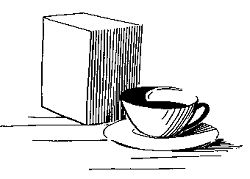
To say, مانه غلط نمبر مِلاؤ شو - maa na ghalat numbur miláaw sho literally means, 'I wrong number was dialled from me'. This way of talking, without admitting personal fault, is the norm in a culture which does not readily accept responsibility for error. For example, the excuse for breaking a cup is, پیاله ماته شوه - pyáala máata shwa (the cup became broken).
Memorising moments
matalóona
NOTE:
naswaar is a wad of tobacco placed under the lip. Kheshko is a village near Nowshera.
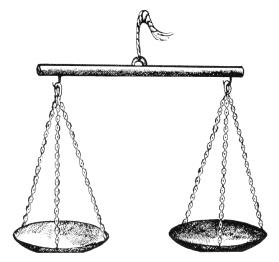
Rahman Baba
Exercises for Lesson Sixteen
Role Play: Visit a restaurant or ask about cooking.
Make the following sentences negative:
- Complete the following sentences with the appropriate subjunctive form of the verb:
- Complete the following questions with the first person subjunctive form of the verb:
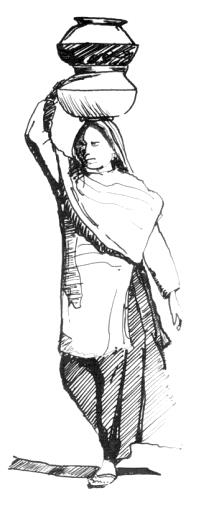
The subjunctive form of some irregular verbs
The subjunctive form of کېدل - kedúl (to become)
| singular | plural | |
|---|---|---|
1st | shum شم | shoo شُو |
2nd | she شې | shey شُئ |
3rd | shee شی | shee شی |
The subjunctive form of کېدل - kedúl (to happen)
| singular | plural | |
|---|---|---|
1st | óoshum وشم | óoshoo وشُو |
2nd | óoshe وشې | óoshey وشُئ |
3rd | óoshee وشی | óoshee وشی |
The subjunctive form of کول - kawúl (to do)
| singular | plural | |
|---|---|---|
1st | óokRum / óokum وکړم / وکم | óokRoo / óokoo وکړو / وکو |
2nd | óokRe / óoke وکړې / وکې | óokRey / óokey وکړئ / وکئ |
3rd | óokRee / óokee وکړی / وکی | óokRee / óokee وکړی / وکی |
The subjunctive form of کول - kawúl (to make)
| singular | plural | |
|---|---|---|
1st | kRum / kum کړم / کم | kRoo / koo کړو / کو |
2nd | kRe / ke کړې / کې | kRey / key کړئ / کئ |
3rd | kRee / kee کړی / کی | kRee / kee کړی / کی |
The subjunctive form of تلل - tlul (to go)
With masculine subjects
| singular | plural | |
|---|---|---|
1st | laaR shum لاړ شم | laaR shoo لاړ شو |
2nd | laaR she لاړ شې | laaR shey لاړ شئ |
3rd | laaR shee لاړ شی | laaR shee لاړ شی |
With feminine subjects
| singular | plural | |
|---|---|---|
1st | laaRa shum لاړه شم | laaRe shoo لاړې شو |
2nd | laaRa she لاړه شې | laaRe shey لاړې شئ |
3rd | laaRa shee لاړه شی | laaRe shee لاړې شی |
The subjunctive form of راتلل - raatlul (to come)
| singular | plural | |
|---|---|---|
1st | ráashum راشم | ráashoo راشو |
2nd | ráashe راشې | ráashey راشئ |
3rd | ráashee راشی | ráashee راشی |
The subjunctive form of وړل - oRul (to take (inanimate objects))
| singular | plural | |
|---|---|---|
1st | yósum یوسم | yósoo یوسو |
2nd | yóse یوسې | yósey یوسئ |
3rd | yósee یوسی | yósee یوسی |